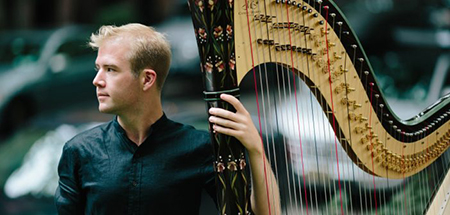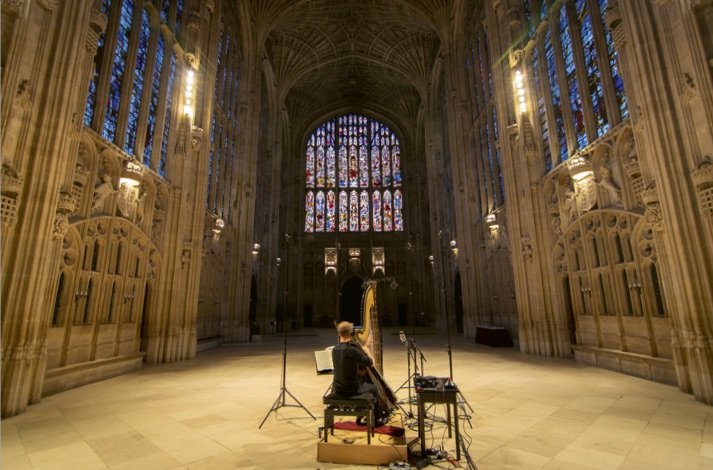by Mike Telin

Joining a long list of arrangers, Parker Ramsay has transcribed the Variations for the modern pedal harp, an instrument for which he holds a master’s degree from Juilliard, in addition to a degree in history from Cambridge University, plus a master’s in historical performance (organ and harpsichord) and an artist diploma (organ) from Oberlin.
Ramsay returned to his undergraduate haunts to record the Goldbergs in Henry VI’s wonderful chapel at King’s College, Cambridge, where he was the first American to serve as organ scholar. Bach: Goldberg Variations was released in September of 2020 on King’s own label.
On Monday, March 21 at 7:30 pm, Parker Ramsay will perform his arrangement of Bach’s “Goldberg” Variations in a Bach Birthday Concert to benefit Music and Art at Trinity Cathedral. Click here for more information.
Prior to the album’s release I spoke to Ramsay and asked him why he chose such an iconic work for his debut recording. He said that he wanted to present the harp as an instrument that is not just capable of playing new music or idiomatic music, but one that is worthy of the great works in the classical canon.
“I’ve played the Goldbergs twice before — very badly on the piano when I was in high school, as many aspiring pianists do, then again on the harpsichord for my master’s degree at Oberlin. In both cases I found myself going to the harp to try and figure some things out. For example, I wanted to hear all the voices at once or hear more color here, and those things could be achieved better on the harp. When I played them on the harsichord, I found myself trying to imitate what I was doing on the harp rather than the other way around.”
When asked what a harp is capable of bringing to the Goldberg Variations that a harpsichord or piano cannot, Ramsay said that the harp is “in between” those two instruments. “It’s plucked, so along with the lute and the guitar, it is a sensitive instrument because there are no hammers. For me it can bring out implied counterpoint — Bach has a wonderful way of taking two voices and making them sound like three or more.”
He noted that one of the things a harp cannot do in the Goldbergs is to play fast. “Harpists only use eight fingers. But what you lose in agility, you gain in expression and the ability to bring out colors that may not exist on the harpsichord or the piano.”
He added that some of the variations were more difficult to transcribe than the others. “I lost a lot of sleep over Variation Eight, because of the issue of the hands running into each other. It’s all arpeggios and that is what the harp does best, but it must sound idiomatic. I looked at Busoni’s transcription for inspiration and I looked at Reger’s two-piano transcription. I looked at a lot of different approaches to see how people got around the fussiness. And I spent a month and a half on Variation One trying to figure out how to make the two voices sound like three.”
Unlike Handel, Bach never composed for the harp, and the ones that did exist at that time would not have been capable of playing the Goldbergs. “There was the standard continuo harp, and the Welsh triple harp that has three rows of strings — two diatonic and one chromatic — and some German harps that used a stringing system from 16th-century Italy.”

During a recent Zoom conversation I asked the harpist how his thoughts about playing the piece have evolved since the recording was made. “In the course of performing it more regularly, I have gotten away from lofty ideas of musicology,” he said. “Now I’m thinking more about the aspects that are contingent on the acoustic in which I am playing. I’m also thinking more about stamina. The harp doesn’t usually play for more than 25 to 28 minutes at a time, so to have 65 minutes of music — it’s a lot to think about.”
Ramsay said he looks forward to bringing the Goldberg Variations to Trinity. “I’m very familiar with the space, so I don’t see any particular performance challenges. I just hope it isn’t cold out — it’s not easy to move your fingers when it’s cold.”
Read our full 2020 conversation with Ramsay here.
Daniel Hathaway contributed to this article.
Published on ClevelandClassical.com March 16, 2022.
Click here for a printable copy of this article


